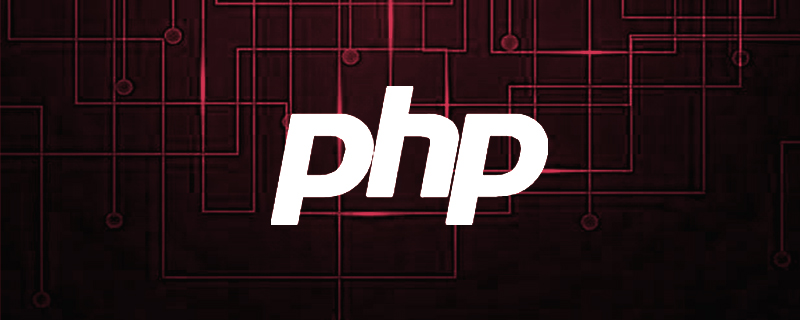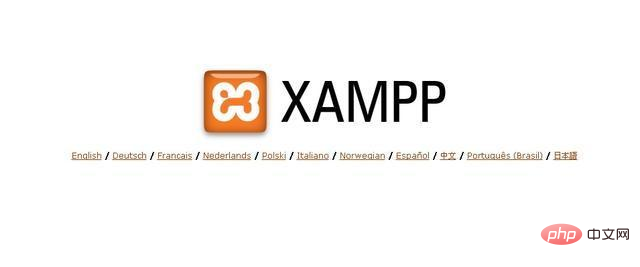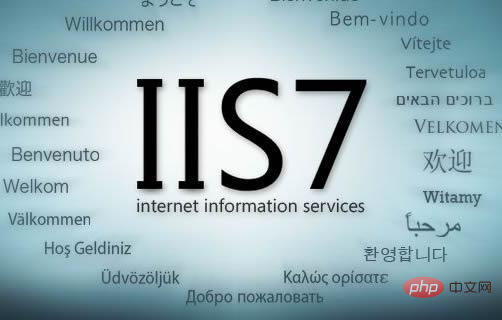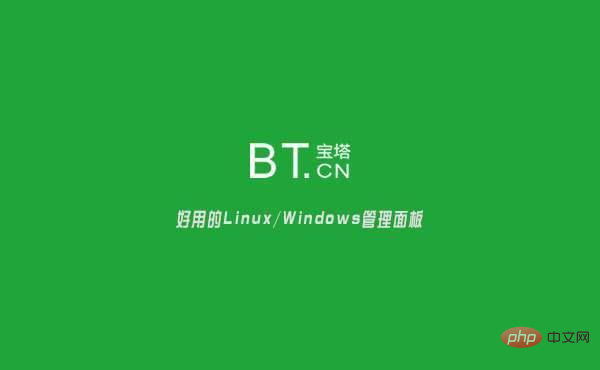What are the PHP environment building tools?
php environment building tools include: 1. phpStudy, which is a program integration package for PHP debugging environment; 2. WampServer, which is an integrated software package of server, PHP interpreter and MySQL database; 3. XAMPP, which is An integrated software package for website building; 4. Pagoda Panel, a server management software, etc.

The operating environment of this tutorial: windows7 system, PHP7.1 version, DELL G3 computer
For novices in PHP development Building a PHP operating environment is a hurdle!
Because you want to develop PHP, building a server environment that can run PHP websites is the first step. The traditional PHP environment software is very complicated. Fortunately, many companies have developed a one-click PHP installation environment, which can be completed with one click. PHP environment configuration greatly saves time in setting up PHP mysql environment! For veterans, installing and configuring the PHP environment is no longer a cumbersome task.
Next, let me share with you seven kinds of PHP development environment building tools. Of course, there are not only these seven, but these are the more common ones;
1. phpStudy

phpStudy is a program integration package for PHP debugging environment;
This package integrates the latest Apache/Nginx PHP MySQL phpMyAdmin ZendOptimizer OpenSSL, one-time It can be installed and used without configuration. It is a very convenient and easy-to-use PHP debugging environment;
This program not only includes the PHP debugging environment, but also includes development tools, development manuals, etc.
2. WampServer

WampServer is an Apache web server, PHP interpreter and MySQL database developed by the French Integrated software packages. This eliminates the need for developers to spend time on tedious environment configuration processes, freeing up more energy for development.
WampServer is the Windows Apache Mysql PHP integrated installation environment, which is the server software for apache, php and mysql under the Windows operating system.
3. XAMPP

Compared with phpStudy and WampServer, XAMPP is not so friendly to beginners, and the operating threshold is slightly higher. It’s much higher; and XAMPP is currently the tool that supports the most operating systems. This is more friendly to programmers who use Windows at work and Mac OS x at home.
XAMPP (Apache MySQL PHP PERL) is a powerful website building integration software package;
The original name of this software package is LAMPP, but in order to avoid misunderstanding, the latest versions have been renamed It is XAMPP;
It can be installed and used under various operating systems such as Windows, Linux, Solaris, Mac OS X, etc., and supports multiple languages: English, Simplified Chinese, Traditional Chinese, Korean, Russian, Japanese, etc. .
Many people know from their own experience that installing an Apache server is not easy;
If you want to add MySQL, PHP and Perl, it is even harder; XAMPP is An easy-to-install Apache distribution that includes MySQL, PHP, and Perl;
XAMPP is really easy to install and use: just download, unzip, and start.
4. MAMP

MAMP is divided into two types: MAMP and MAMP Pro for Mac; I won’t talk about MAMP, MAMP Pro The function is really very powerful, but MAMP only supports Mac OS system, so the advantages and disadvantages are also very obvious;
The name MAMP is the abbreviation of the system component name:
macOS, Apache, MySQL or MariaDB and PHP, Perl or Python.
The name is derived from LAMP, a similar stack of all open source software widely used on websites, but replacing the open source Linux operating system with the proprietary macOS. (Similar "AMP" stacks exist for other operating systems.) But MAMP isn't limited to these component selections. For example, you can use Nginx instead of Apache and MariaDB instead of MySQL.
Some packages containing MAMP (notably Apache and PHP) come pre-installed on macOS. Compatible versions of the remaining versions are easy to install and use. MAMP is often used with and developed for popular CMS programs such as WordPress and Drupal by setting up a local development environment on a laptop or desktop computer without the need for a separate web server.
5. IIS

Internet Information Services (English: Internet Information Services, referred to as IIS) is provided by Microsoft Corporation Based on Internet basic services running Microsoft Windows.
The new IIS manager with graphical interface can be remotely managed through HTTP without opening any ports in the firewall. This management tool is completely extensible.
The new IIS manager with graphical interface supports HTTP remote management protocol, allowing seamless local, remote, and even cross-Internet connections or opening other management ports in the firewall without the need for DCOM.
6. Pagoda Panel

Pagoda Panel is a server management software that supports Windows and Linux systems and can be accessed through the Web Easily manage servers and improve operation and maintenance efficiency.
For example: create and manage websites, FTP, databases, with visual file manager, visual software manager, visual CPU, memory, traffic monitoring charts, scheduled tasks and other functions.
Pagoda panel has extremely fast and convenient one-click configuration and management. It can configure the server environment (LAMP/LNMP/Tomcat/Node.js) with one click, deploy SSL with one click, and perform off-site backup;
Provides SSH opening and closing service, SSH port change, ping ban, firewall port release and operation log viewing;
CPU, memory, disk IO, network IO data monitoring, you can set the number of days to save the record and view the data of a certain day at will ;
Scheduled tasks can be added and executed periodically, support SHELL scripts, provide website, database backup and log cutting, and support one-click backup to Youpai cloud storage space, or other cloud storage space;
You can easily manage the server software used for installation through the web interface, as well as practical extension plug-ins;
Integrate a convenient and efficient file manager that supports uploading, downloading, packaging, decompression, and file editing and viewing.
7. UPUPW

UPUPW PHP environment integration package is currently the most distinctive web server PHP suite under the Windows platform, including Apache version, Ngix version and Kangle version: Apache/Nginx PHP MySQL phpMyAdmin Xdebug Memcached eAccelerator ZendGuardLoader/OptimizerUPUPW PHP suite saves you the complicated process of setting up a web server PHP environment. Download and unzip it to a non-Chinese directory on any Windows computer and run it.
8. PHPnow
PHPnow is a green and free Apache PHP MySQL environment package package under Win32. Easy to install and quickly build a PHP environment that supports virtual hosts. Comes with PnCp.cmd control panel to help you quickly configure your kit and is very convenient to use.
PHP Video Tutorial"
The above is the detailed content of What are the PHP environment building tools?. For more information, please follow other related articles on the PHP Chinese website!

Hot AI Tools

Undresser.AI Undress
AI-powered app for creating realistic nude photos

AI Clothes Remover
Online AI tool for removing clothes from photos.

Undress AI Tool
Undress images for free

Clothoff.io
AI clothes remover

AI Hentai Generator
Generate AI Hentai for free.

Hot Article

Hot Tools

Notepad++7.3.1
Easy-to-use and free code editor

SublimeText3 Chinese version
Chinese version, very easy to use

Zend Studio 13.0.1
Powerful PHP integrated development environment

Dreamweaver CS6
Visual web development tools

SublimeText3 Mac version
God-level code editing software (SublimeText3)

Hot Topics
 1378
1378
 52
52
 PHP 8.4 Installation and Upgrade guide for Ubuntu and Debian
Dec 24, 2024 pm 04:42 PM
PHP 8.4 Installation and Upgrade guide for Ubuntu and Debian
Dec 24, 2024 pm 04:42 PM
PHP 8.4 brings several new features, security improvements, and performance improvements with healthy amounts of feature deprecations and removals. This guide explains how to install PHP 8.4 or upgrade to PHP 8.4 on Ubuntu, Debian, or their derivati
 How To Set Up Visual Studio Code (VS Code) for PHP Development
Dec 20, 2024 am 11:31 AM
How To Set Up Visual Studio Code (VS Code) for PHP Development
Dec 20, 2024 am 11:31 AM
Visual Studio Code, also known as VS Code, is a free source code editor — or integrated development environment (IDE) — available for all major operating systems. With a large collection of extensions for many programming languages, VS Code can be c
 7 PHP Functions I Regret I Didn't Know Before
Nov 13, 2024 am 09:42 AM
7 PHP Functions I Regret I Didn't Know Before
Nov 13, 2024 am 09:42 AM
If you are an experienced PHP developer, you might have the feeling that you’ve been there and done that already.You have developed a significant number of applications, debugged millions of lines of code, and tweaked a bunch of scripts to achieve op
 How do you parse and process HTML/XML in PHP?
Feb 07, 2025 am 11:57 AM
How do you parse and process HTML/XML in PHP?
Feb 07, 2025 am 11:57 AM
This tutorial demonstrates how to efficiently process XML documents using PHP. XML (eXtensible Markup Language) is a versatile text-based markup language designed for both human readability and machine parsing. It's commonly used for data storage an
 Explain JSON Web Tokens (JWT) and their use case in PHP APIs.
Apr 05, 2025 am 12:04 AM
Explain JSON Web Tokens (JWT) and their use case in PHP APIs.
Apr 05, 2025 am 12:04 AM
JWT is an open standard based on JSON, used to securely transmit information between parties, mainly for identity authentication and information exchange. 1. JWT consists of three parts: Header, Payload and Signature. 2. The working principle of JWT includes three steps: generating JWT, verifying JWT and parsing Payload. 3. When using JWT for authentication in PHP, JWT can be generated and verified, and user role and permission information can be included in advanced usage. 4. Common errors include signature verification failure, token expiration, and payload oversized. Debugging skills include using debugging tools and logging. 5. Performance optimization and best practices include using appropriate signature algorithms, setting validity periods reasonably,
 PHP Program to Count Vowels in a String
Feb 07, 2025 pm 12:12 PM
PHP Program to Count Vowels in a String
Feb 07, 2025 pm 12:12 PM
A string is a sequence of characters, including letters, numbers, and symbols. This tutorial will learn how to calculate the number of vowels in a given string in PHP using different methods. The vowels in English are a, e, i, o, u, and they can be uppercase or lowercase. What is a vowel? Vowels are alphabetic characters that represent a specific pronunciation. There are five vowels in English, including uppercase and lowercase: a, e, i, o, u Example 1 Input: String = "Tutorialspoint" Output: 6 explain The vowels in the string "Tutorialspoint" are u, o, i, a, o, i. There are 6 yuan in total
 Explain late static binding in PHP (static::).
Apr 03, 2025 am 12:04 AM
Explain late static binding in PHP (static::).
Apr 03, 2025 am 12:04 AM
Static binding (static::) implements late static binding (LSB) in PHP, allowing calling classes to be referenced in static contexts rather than defining classes. 1) The parsing process is performed at runtime, 2) Look up the call class in the inheritance relationship, 3) It may bring performance overhead.
 What are PHP magic methods (__construct, __destruct, __call, __get, __set, etc.) and provide use cases?
Apr 03, 2025 am 12:03 AM
What are PHP magic methods (__construct, __destruct, __call, __get, __set, etc.) and provide use cases?
Apr 03, 2025 am 12:03 AM
What are the magic methods of PHP? PHP's magic methods include: 1.\_\_construct, used to initialize objects; 2.\_\_destruct, used to clean up resources; 3.\_\_call, handle non-existent method calls; 4.\_\_get, implement dynamic attribute access; 5.\_\_set, implement dynamic attribute settings. These methods are automatically called in certain situations, improving code flexibility and efficiency.




